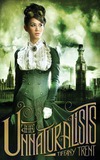
Right on the heels of Year Zero, I have another book that got itself on my list based on the potential in its world building: The Unnaturalists. I mean, how can you not be intrigued by a world where London seems to have been yanked into another world, where Science[1] has grown into a religion.
You have things like people cursing with “by Saint Darwin and all his apes”. A world where you hear someone say (with a straight face) “I turn my attention to another window, the one in which Saint Pasteur smites the Demon Byron for his licentious poetry.”
Therein lies the problem with the world though. It never quite gelled for me. There is quite a lot of world there, just waiting to be tapped, but it seemed too busy. It seemed to be a steampunk London torn from our world some time in the past, sent into a world where magic still holds sway–which is particularly odd. How do you have Science grow to the point it has in this story in a world where there are literal living fairies and sphinxes hanging around?
Also, it was never entirely clear what the rules were in the world. I don’t strictly speaking have to know what the worlds are for magic systems, but I do prefer that there are rules. I never get the impression that is the case here. We have the last Witch in the world; Architects which can do… something; Tinkers with the ability to commune with Elemantals (essentially animstic spirits); and all manner of magical beasties. Don’t get me wrong, there were some particularly cool visuals, it just didn’t quite get beyond that.
Beyond the world building, the writing style was odd. There were two story lines: a rich girl rebelling against Victorian gender roles and a Tinker boy from the outskirts with the only remaining Tinker magic among his people. The former was written in first person present tense[2], the latter in third person. I can see where the two characters tie together, but for the most part, there seem to almost be two stories going on in parallel.
Finally, the love story just felt strange. Pedant Lumin/Hal/Bayne/The Architect is referred to four different ways at different points in the book; it took me a while to figure out they were all the same person. As a result, I couldn’t figure out who he was and what in the world Vespa saw in him. It felt like the author was trying to make him adequately interesting, but it felt forced.
Overall, it took me a while to get finish this book. It never quite got to the point where I just wanted to put it down, but at the same point, it didn’t keep me turning pages. So it goes. I’m sure there are many people who would enjoy this style of book. I’m just not one of them. So it goes.
[1] This book realy likes proper nouns [2] Which already has to fight an uphill battle in my mind [3] Although I was at 7 before this book…